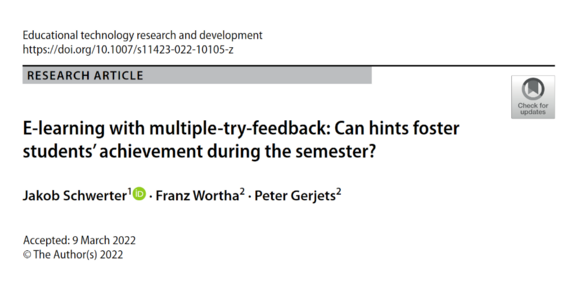New journal article published in Educational technology research and development
- Publications
- News

E-learning opportunities have become an increasingly important component of university education. Various laboratory studies have shown that e-learning environments can meaningfully enhance learning by incorporating various interventions and design choices (e.g., providing feedback and scaffolds). However, many computer-based interventions have not yet been applied in authentic university courses, raising questions about whether and how the provision of certain forms of feedback works and scales in an applied context. In this paper, the researchers addressed this research gap. Specifically, they investigated whether including an elaborative component (hints) in multiple-try feedback increases student learning in e-learning exercises in an undergraduate statistics course. In one exercise, after completing a statistical problem, one group received feedback that conveyed knowledge about the correct response, while the other group additionally received elaborative feedback in the form of hints. The researchers conducted an experimental comparison of these two types of feedback with third-semester sociology students in the tutorial component of an introductory statistics course. The results show that additional feedback helps students perform better during the session and on a delayed test one week later. Implications for further research and the application of such e-learning environments in university settings are discussed.





